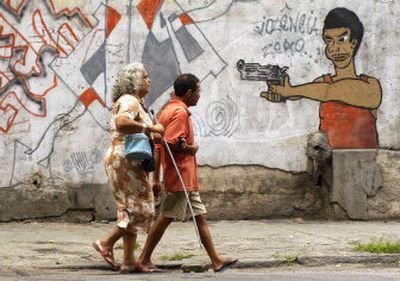Brazil voting on national gun ban

RIO DE JANEIRO, Brazil – Brazil, which has more annual gun deaths than any other country, could be poised to launch dramatic measures to stop the violence that’s paralyzed whole cities.
Today the 186 million-person country will become the first in the world to hold a nationwide referendum on banning the sales of guns and bullets to almost all civilians.
The result is anything but certain. A public opinion survey this month by the private research firm IBOPE showed that 49 percent of Brazilians oppose a ban and 45 percent support it. Given the survey’s 2.2 percentage-point margin of error, the percentages are a statistical tie.
U.S. interest groups on both sides of the gun issue are watching the vote closely.
If the referendum passes, Brazil would be a launching pad for similar campaigns in the United States, said Andrew Arulanandam, a spokesman for the National Rifle Association.
“The American gun-control lobby will be energized, but gun owners will be mobilized,” he said.
Studies show there are more than 17 million guns in Brazil, about half of them illegal and a quarter of them in the hands of criminals. Americans own an estimated 192 million firearms.
Debate in Brazil over the issue has been intense. In Rio de Janeiro, known worldwide for its “favelas,” or hillside slums, the issue is tied closely to concerns about drug trafficking and street crime.
Improvised leaflets about the referendum dotted one favela, Tavares Bastos, which was plagued with shootings and drug dealing for years. That stopped about five years ago when the state police’s special operations team relocated to a modern building beside the slum.
Resident Maria Jose da Silva, who sports a small “Yes” flag by her window supporting the ban, said that experience had convinced many of her neighbors that they could relinquish their firearms and trust police to protect them.
“We don’t need guns here,” da Silva said. “Using them only has the final result of killing, and we’ve seen a lot of that here.”
Many others in the slum disagreed, saying the ban would leave them defenseless. Many also said it would feed the city’s booming black market for weapons.
In front of one doorway, a homemade flier read: “Here in this house there are no guns. Mr. Bandit: You can act without fear of meeting anyone armed. The law of disarmament guarantees your security.”
Proposals for the referendum began shortly after President Luiz Inacio Lula da Silva was elected in 2002, and his administration and allies included it in a package of gun-law changes that won congressional approval in late 2003. Among other provisions, the revisions required that buyers undergo psychological tests and prohibited people from carrying firearms in public.
The administration failed to win legislative approval for an outright ban on gun sales and settled for the referendum.
The ballot question reads: “Should the sale of firearms and munitions be prohibited in Brazil?” If it passes, the measure will become law immediately. Brazil’s constitution doesn’t protect the right to bear arms.
If the referendum passes, Brazil will join a handful of countries – Jamaica, Japan and the United Kingdom, among them – that ban almost all gun sales to civilians.
For a country in which guns kill 21 out of every 100,000 people annually, about twice the U.S. rate, the debate isn’t just rhetorical.
Over the past two months, gun fights between favela gangs and Rio de Janeiro police have closed major highways and tunnels repeatedly and sparked panic among residents.
In a June report by UNESCO, Brazil ranked second among 57 countries studied in the percentage of gun deaths. Coming after Venezuela, Brazil even beat out Israel, where fighting over disputed territories has killed hundreds.
In sheer numbers, Brazil far outpaces any other country in the UNESCO study in gun deaths, with 36,000 people slain last year.
The United States wasn’t included in the report.
“We are the world champions in gun deaths, and it’s a disgrace,” said Alessandro Molon, a Rio de Janeiro state deputy who supports the ban. “I know arms are not the root cause of violence, but they facilitate it. They turn what might be routine disputes into mortal crimes.”
He cited statistics showing that a third of the firearms taken from criminal suspects in his state had been stolen from legal gun owners.
“Taking legal guns off the streets will also take them from criminals,” he said.